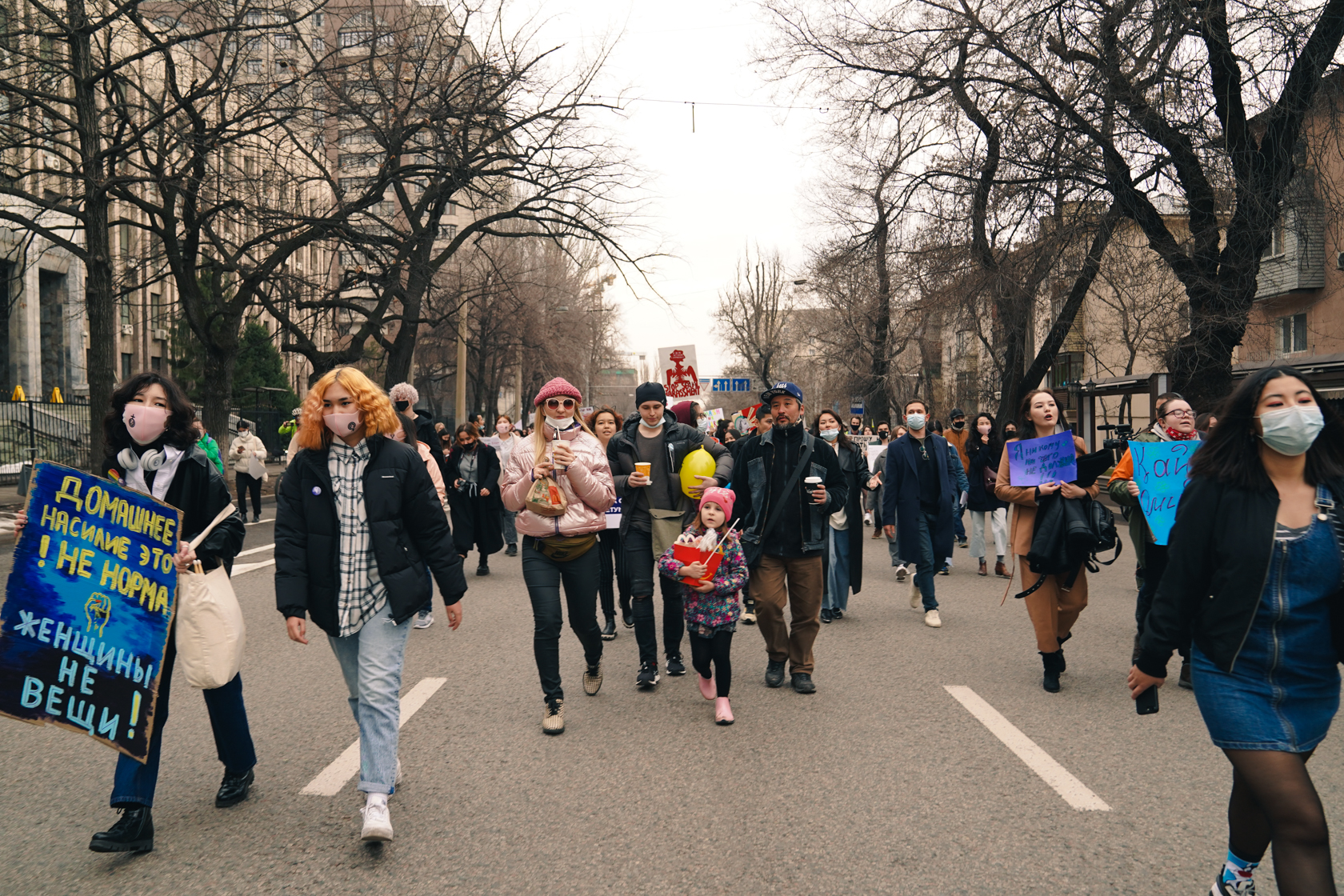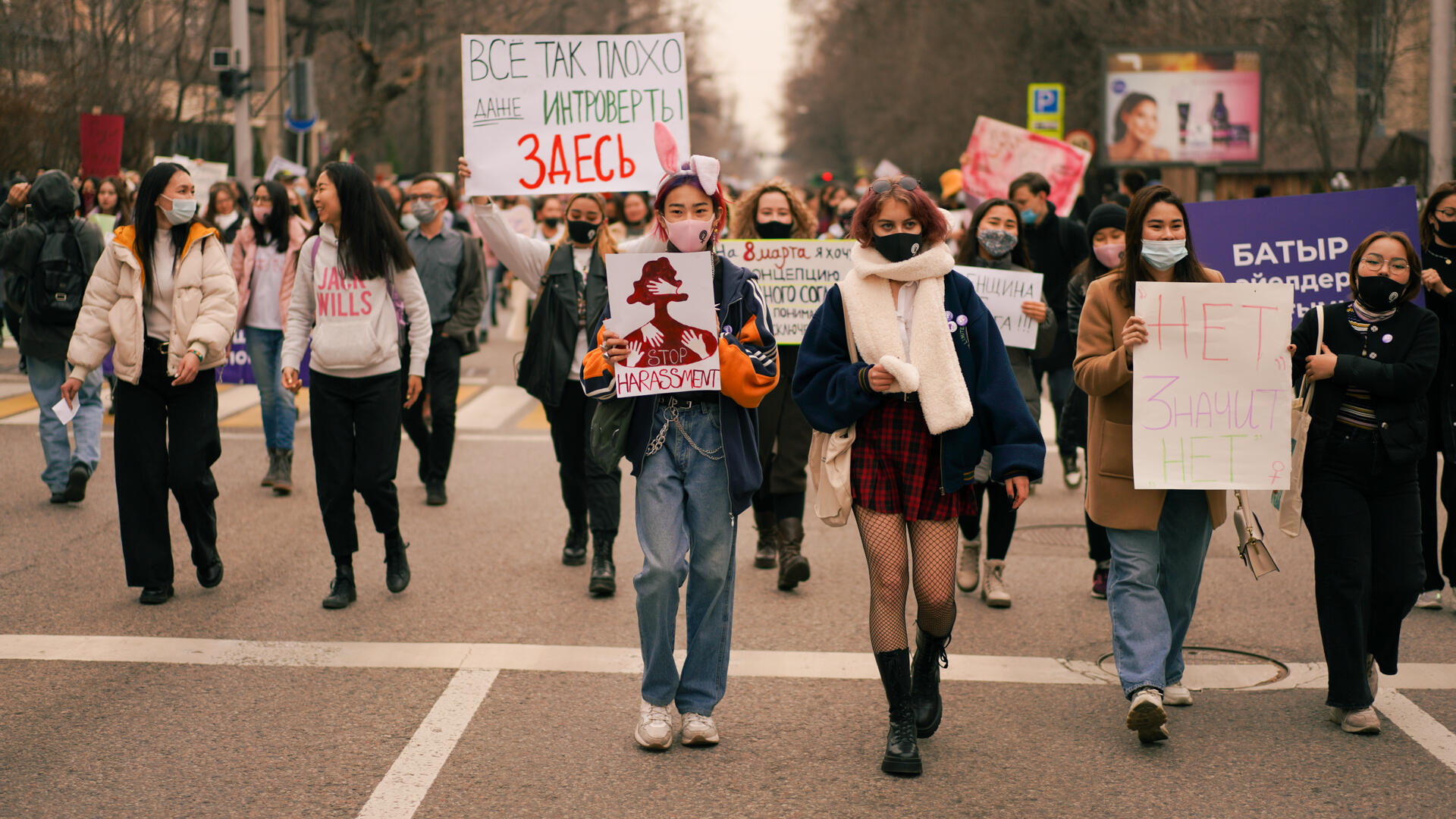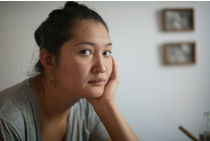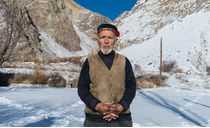The largest march for women's rights in the history of independent Kazakhstan took place on March 8 in Almaty. The 2021 Women's March can also be considered the largest peaceful gathering for civil, labor, and political rights in recent years.


Photo: Malika Autalipova

Photo: Malika Autalipova





Photo: Malika Autalipova
The march started in Gandhi Park along Shevchenko Street. Due to the large number of people that gathered, the column of people marching stretched for several hundred meters. After walking about five kilometers, the participants of the march halted at the square near the monument to Shokan Ualikhanov, where they held a rally. According to various estimates, 500 to 1000 people took part in the march and rally this year.

Photo: Timur Nusimbekov

Photo: Timur Nusimbekov

Photo: Timur Nusimbekov





Photo: Timur Nusimbekov
The theme of the Women's March was the declared rights and activism of diverse Kazakhstani women. Its main slogan was “Feminism will save Kazakhstan”.

Photo: Malika Autalipova

Photo: Malika Autalipova




This year, for the first time, organizers of the women's march received approval from the city akimat. Other peaceful rallies, flash mobs and pickets in Kazakhstan have often ended in detentions and arrests of participants, hours of kettling, attacks by government sympathizers and provocateurs and other types of pressure on the peaceful gathering of civilians.


Photo: Timur Nusimbekov




Photo: Timur Nusimbekov

Photo: Timur Nusimbekov

Photo: Timur Nusimbekov
After a similar march on March 8, 2020, civil activists Arina Osinovskaya and Fariza Ospan were prosecuted and found guilty of petty hooliganism and participation in an unsanctioned rally. Osinovskaya and Ospan pleaded not guilty. This year, they were organizers of the march.

Photo: Malika Autalipova






Holding the march on International Women's Day has become an annual tradition for the feminist movement in Kazakhstan. At the rally, Veronika Fonova, one of the organizers of the march and a member of the KazFem group, reminded the audience that in 2017 about 20 people took part in the first women's march.

Photo: Timur Nusimbekov

Photo: Timur Nusimbekov


Photo: Timur Nusimbekov

Photo: Timur Nusimbekov

In 2019, the march was disrupted. In 2020 several hundred people took part, and in 2021 the number was several times higher than all previous marches and rallies.







Independent organizations and groups organized the march: "KazFem", FemAgora, "Feminita", and the public fund “SVET”. The march was attended by representatives of different generations, professions and societal groups: schoolchildren, university students, human rights activists, participants of various art and feminist groups, representatives of culture, art, science, media and sports.



Photo: Timur Nusimbekov

Photo: Timur Nusimbekov

Photo: Timur Nusimbekov

Residents of Aktau, Astana, Atyrau, Shymkent and other cities of Kazakhstan took part in the march in addition to residents of Almaty.

Photo: Malika Autalipova





This year, the embassies of Belgium, Bulgaria, Canada, Estonia, Finland, France, Germany, Great Britain and Northern Ireland, Latvia, the Netherlands, Portugal, Slovakia, Slovenia, Spain, Sweden, Switzerland and the Representative Office of the European Union in Kazakhstan expressed solidarity with the participants of the Women's March in an official joint statement.

Photo: Malika Autalipova





Photo: Malika Autalipova
In February 2021, as KAZTAG reports: “The European Parliament harshly criticized the political situation in Kazakhstan and drew attention to the 'alarming deterioration of the general human rights situation and repression against civil society organizations in Kazakhstan, which have been noted in recent weeks: severe restrictions imposed on the right to freedom of expression, peaceful assembly, and association." According to European parliamentarians, “civil society and human rights organizations working in Kazakhstan are facing increasing pressure and punishment from the country's authorities, which impedes reform efforts and limits the important work of civil society.”

Photo: Timur Nusimbekov

Photo: Timur Nusimbekov


Photo: Timur Nusimbekov


Photo: Timur Nusimbekov

Photo: Timur Nusimbekov

Photo: Malika Autalipova

Photo: Malika Autalipova







Photo: Timur Nusimbekov

Photo: Timur Nusimbekov

Photo: Timur Nusimbekov


Photo: Malika Autalipova


Photo: Malika Autalipova


Photo: Malika Autalipova


At the end of the event, in front of the monument honoring the educator and scientist Shokan Ualikhanov, the organizers of the rally thanked the audience and assured them that marches and rallies for women's rights would be held annually and would become even more massive. Hundreds of participants and participants of the march and rally began to chant: "Rakhmet!" – thank you, in Kazakh and in Russian.


Photo: Malika Autalipova

Photo: Malika Autalipova

Photo: Malika Autalipova

Photo: Malika Autalipova


Фото: Малика Ауталипова






